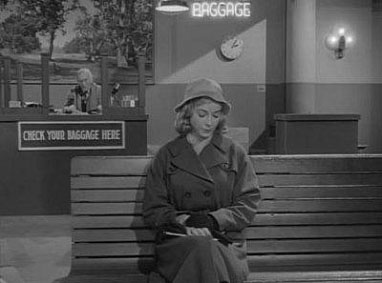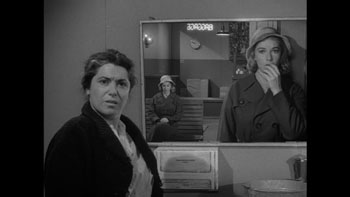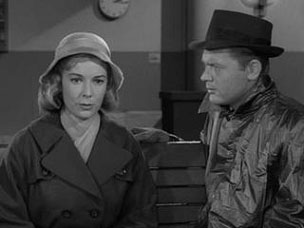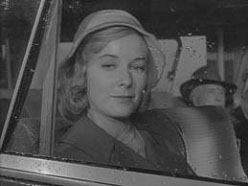Beyond the Mirror: Hidden Meaning in "Mirror Image"
by Michael Martin DeSapio"Mirror Image" is widely regarded by Twilight Zone fans as one of the gems of the series' first season (1959-60). Yet while many of Rod Serling's other Twilight Zone scripts state their message outright, in "Mirror Image" we are confronted with an eerie, enigmatic little tale with no obvious meaning. To quote one of the episode's main characters, "This one's tough to figure out". Serling's tersely written, even mundane dialogue, combined with John Brahm's visually evocative mise en scene, conspire to makes us feel that there must be more here than meets the eye - that every line and action must hold hidden meanings. "Mirror Image" has traditionally been viewed as an effective thriller, an atmospheric evocation of a late-night bad dream. It is my intention to show that it is much more; that one can find in it not only the perennial Twilight Zone theme of identity, but also subtle allusions to totalitarianism, McCarthyism, and other Cold War-era themes which Serling dealt with in a more "explicit" manner in other episodes. These allusions, revealed through character, setting, dialogue and cinematography, combine to make "Mirror Image" one of the most fascinating and subtle of all Twilight Zone episodes.
The plot of "Mirror Image" can be summarized as follows. While waiting for a bus in a depot late on a rainy November night, a young woman named Millicent Barnes has several experiences that assault her sense of reality; these culminate in her momentarily glimpsing her exact double (her "mirror image"). Millicent comes to believe that this double is a malignant force who is trying to annihilate her. A fellow traveler named Paul Grinstead tries to calm Millicent's nerves, but after her sanity starts to unravel, he calls the police to have her taken away. In the final moments of the episode, Paul discovers to his horror that Millicent's fears were justified: he sees his own double.
The Bus Depot
In few Twilight Zone episodes are setting and atmosphere used as effectively as in "Mirror Image". In one broad sweep, the opening camera shots take us from the cosmos to the microcosm of a bus depot in upstate New York: the traditional space-scape of the Twilight Zone title sequence dissolves into a stormy night sky (portending the danger that will engulf our characters) and the camera descends upon the depot, entering it through a shuttered window. We see the solitary Millicent seated on a bench, the ticket agent at his desk, an elderly couple dozing on another bench, and a cleaning lady mopping the floor. The clock on the wall reads 2:05 AM. The only decoration in the depot are a couple of pleasant nature scenes hanging on the walls; not only do these serve as an ironic comment on the dreariness of the place, they also point beyond it to the happiness and freedom waiting on the other end of one's journey. The opening tableau of "Mirror Image" is Edward Hopper-like in its depiction of a depersonalized modern urban setting, a transitory place where people gather anonymously without interacting with one another; a setting in which the human personality risks being swallowed up.

Millicent Barnes
"Millicent Barnes, age twenty-five, young woman waiting for a bus on a rainy November night. Not a very imaginative type is Miss Barnes, not given to undue anxiety or fears, or, for that matter, even the most temporal flights of fancy. Like most career women, she has a generic classification as a, quote, girl with a head on her shoulders, end of quote. All of which is mentioned now because, in just a moment, the head on Miss Barnes' shoulders will be put to a test. Circumstances will assault her sense of reality and a chain of nightmares will put her sanity on a block. Millicent Barnes, who, in one minute, will wonder if she's going mad."
The sight of a woman traveling alone was exceptional in 1960, when "Mirror Image" was originally aired, and Serling presents Millicent Barnes as an emblem of the new independent "career woman" - strong, forthright, businesslike, efficient. Appropriately enough, the name "Millicent" derives from Germanic roots meaning "work" and "strength". As rarefied and Victorian as Millicent's first name may sound, though, her surname is as drab as the thing it describes (a "barn"): Serling's narration tells us that she is a practical person of little imagination not prone to "temporal flights of fancy". From the start, a conflict is set up between Millicent and her environment. She is young and well-dressed, where the other people in the depot are older and rather shabby; her ladylike manners and refined accent clash with the gruffness of the ticket agent and the low-class dialects of some of the minor characters. She is also blond-haired, a trait emblematic of goodness or innocence (a word in fact suggested by the name "Millicent"). Many of Serling's characters are outsiders or misfits; Millicent is so in that she is out of step with the uncivil and depersonalized modern urban environment represented by the bus depot.
The Symbol of Baggage
Millicent, as we shall eventually learn, is a private secretary who has quit her job and is traveling to Buffalo this night to start a new one; thus she is at a turning point, on the verge of leaving her old life behind and beginning anew. The suitcase she carries with her can be taken as a symbol of her identity. It mysteriously changes place in the depot several times, just as Millicent's identity undergoes some disorienting dislocations. The suitcase's "broken handle" is emblematic of Millicent's frazzled sense of self and also, perhaps, of an emotional trauma already brewing in her. This raises some tantalizing questions: Is Millicent running away? Did she quit her job under turbulent circumstances? Is the shock she feels when she glimpses her double in the restroom mirror a sense of revulsion at "seeing herself", confronting her identity? The neon sign in the depot reading "Baggage" is a telling symbol, suggesting the emotional "baggage" which Millicent carries with her. In this light, Paul Grinstead's offering to carry her suitcase for her later on suggests that he is offering to share her woes. After seeing her double for the second time, Millicent's suitcase disappears, never to be seen again for the rest of the episode; her identity has been annihilated.

The Symbol of the Mirror Image
The device of mirrors was used frequently in Twilight Zone, particularly in the series' first season. The "mirror image" of this episode's title refers, of course, to the exact copy of herself which Millicent glimpses, first in the restroom mirror and then seated on the bus. Yet the episode plays on the theme of the "mirror image" in other ways too. Duality is present everywhere: the benches, for example, are two-sided; there are two elderly people in the depot; and during Serling's initial voice-over Millicent can be seen with one glove on and one off. The "mirror" theme is also suggested by the face-to-face dialogues which Millicent has with the ticket agent, the cleaning lady, and fellow traveler Paul Grinstead. These interactions create distinct dynamics. The old ticket agent (whom we will discuss shortly) is Millicent's opposite, a disapproving authority figure; the cleaning lady is a warm, motherly figure, genuinely concerned about Millicent's welfare; and Paul is a peer and friend who is also a potential romance - in short, Millicent's "mirror image".
Paul Grinstead
Paul drops in suddenly and almost miraculously in the middle of the episode, returning to Millicent a handbag which she supposedly dropped. He happens to be waiting for the same bus as Millicent - a "fellow traveler" in life. He has narrowly escaped disaster: the taxi he was taking to the bus depot crashed into a tree, forcing him to walk the rest of the way in the rain. Paul's Dickensian surname of "Grinstead" suggests that he is dependable and good-natured ("steady grin") and he is someone that a person can take refuge in ("homestead"); at the end of the episode, he will take Millicent's place as the victim of the "mirror image" phenomenon (he will exist in her stead), and his double will grin sadistically at him. Like Millicent, Paul is well-dressed, well-mannered, and of a higher social class than the others in the depot; and also like her, he is light-haired. While Paul lends a friendly ear to Millicent's strange tale, he sits quite close to her in profile in a manner that suggests - once again -a "mirror image". Millicent and Paul's meeting lends a compelling emotional chiaroscuro to "Mirror Image": the potential for bonding it opens up causes us to root for the possibility of romance as the pair boards the bus and an escape from the purgatorial depot seems inevitable.
The Ticket Agent
The old ticket agent is a vividly drawn character who epitomizes everything that is unpleasant about the bus station. For most of the episode, he sits at his desk in front of one of the nature paintings, absorbed in a magazine. When Millicent approaches him to ask when her bus will arrive, he replies (in a rude tone, without looking up at her) that this is her third time there. He claims that Millicent has repeatedly asked about the bus and that she has checked her bag at the luggage counter; Millicent denies both these things. Because the episode is told from Millicent's perspective, we share her bewilderment at the ticket agent's accusations. On one level, the ticket agent is a typical comic eccentric character; his constant peevishness and his odd archaic dialect, peppered with phrases like "I'd as lief" and "Unasked, I'll tell you what I think" make us laugh in spite of his brusqueness toward Millicent. But the ticket agent has a darker side as well. That he is a symbol of a modern bureaucrat is obvious; yet as the episode progresses he evolves from a bureaucratic figure to a chillingly dictatorial one. Annoyed by Millicent's persistent queries - annoyed, in essence, by her questioning of the strange goings-on in the bus depot - he orders her to "go over there and sit down and breathe through your nose and let me read my magazine". Later, after Millicent has fainted as a result of seeing the double for the second time and is being tended to by Paul and the cleaning woman, he turns out the lights in the station to save energy, declaring "When not in use, turn off the juice - that's what I always say". Although the adage refers to electricity, it can also suggest the "disposal" of "undesirable" human lives in a totalitarian state. Indeed, a few moments later the ticket agent will encourage Paul to have Millicent taken away ("To tell you the truth, she kind of gives me the willies...I'd as lief she got out of here somehow").

The Doppelganger
It is at this point - the beginning of the episode's "second act" - that the central theme of the doppelganger comes into full play. As Millicent and Paul sit in the darkened station, Millicent feverishly explains her theory of an "identical twin" from a "parallel world" who is trying to "replace" her. The doppelganger (a ghostly double of a living person who haunts its living counterpart, a common theme in folklore) can be related symbolically to the social history of the mid-twentieth century. During this era, many Americans conceived of the Soviet Union as a "parallel world" to the democratic U.S., and fears of communist infiltration into America mounted, most notoriously finding expression in the communist-hunting campaign of Senator Joseph McCarthy. Communists were thought to be hiding among ordinary Americans, quietly carrying out a campaign of indoctrination. In the classic science fiction film The Invasion of the Bodysnatchers (1956), the people in a California town are replaced by emotionless simulated humans grown from pods; critics have interpreted this as an allegory of the fear of communist takeover in America. The doppelganger in "Mirror Image" can be read in a similar light - as the symbol of paranoia (irrational or otherwise) about the annihilation of one's identity by a hostile force.
As in many Twilight Zone episodes, there is a strong sense of a supernatural presence in "Mirror Image", a sort of mysterious Twilight Zone god which is watching our protagonists and mischievously toying with them. Millicent's belief in this supernatural force (which the level-headed Paul calls "a little metaphysical for me") could be seen as a metaphor for religious belief. The ticket agent's question to Paul after Millicent's arrest, "What was she talking about - the thing about another life?" resembles scoffing at religious faith, for "another life" could be read as the afterlife. Like a communist dictator, the ticket agent has no room for mystery or the metaphysical; for him, the only reality is the drab existence of the bus depot. Thus, Millicent's "crime" is a failure to conform to the accepted way of thinking; her arrest accordingly has a police-state brutality about it, the officers grabbing her and shuffling her off in the police car with not so much as an explanation. Paul's subsequent experience of encountering his own doppelganger can be seen as comeuppance for his strict rationalism, for doubting the existence of the unseen world.
Millicent's arrest, furthermore, connects with a theme which George Clayton Johnson would use in his Twilight Zone episode "Nothing in the Dark": the thing that is most attractive is sometimes the thing most to be feared. In this case, the kind stranger (Paul) who helped Millicent when she was in need is also the one who betrays her. In unburdening herself and sharing her secret fears with another human being, Millicent precipitates her own downfall. Paul, like Millicent before her experiences in the bus station, is a realistic and practical person who believes that there is always a rational explanation to be found. A moment after the arrest, however, Millicent's "madness" is transferred to Paul. Before settling down on the bench to "take a snooze", Paul pauses to refresh himself at the water fountain; when he looks up, his bag is gone, and a man is running out the door of the depot. Paul chases the figure outside and is horrified to discover that it is an exact copy of himself, its face a mask of sadistic glee; the double outruns Paul, remaining ever out of grasp. In an example of the cyclical plot framework which Serling frequently used, Paul has, in effect, become the new protagonist of the drama. Furthermore, he can be seen as the real "mirror image" who, just as Millicent feared, has unwittingly "moved her out" and replaced her in the world - only to have the tables turned on him by the malignant forces at work in the Twilight Zone.
Ironically, the bus depot itself turns out to be Millicent's "parallel plane", a distorted version of reality where nothing is as it seems in the normal, rational world. Those who enter the station - first Millicent, then Paul - are unnerved, baffled, and finally driven away as a result of glimpsing their doubles, glimpsing the inexplicable. The ending of "Mirror Image" leaves us with a feeling of dread and uncertainty, which Serling's closing narration does little to ease:
"Obscure metaphysical explanation to cover a phenomenon, reasons dredged out of the shadows to explain away that which cannot be explained. Call it parallel planes or just insanity. Whatever it is, you find it in the Twilight Zone."
The elusiveness of this closing narration sums up the spirit of "Mirror Image". Unlike, say, "The Monsters Are Due on Maple Street" or "The Obsolete Man", "Mirror Image" doesn't have a homily to preach; nor, for that matter, does it have recourse to the more obvious paraphernalia of science fiction. Rather, it invites us into an ordinary little world where extraordinary things happen, where the fantastic collides with the everyday. Using simple means, Rod Serling and John Brahm (not to mention Vera Miles, Martin Milner, and the other actors) have created in "Mirror Image" an unforgettable miniature masterpiece, one that presents profound human truths in exquisitely veiled form.

To contact Michael, send email to michaelmartind@gmail.com
Check out Michael's screenplay,
